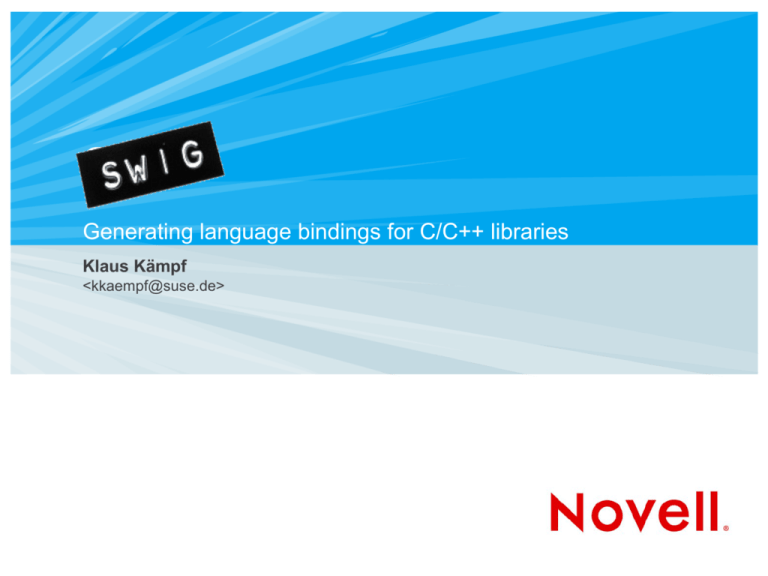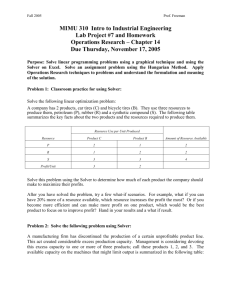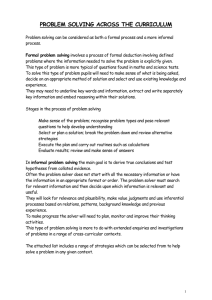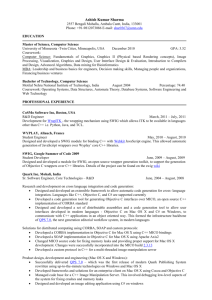
SWIG
Generating language bindings for C/C++ libraries
Klaus Kämpf
<kkaempf@suse.de>
What and why ?
SWIG is an interface compiler that connects programs
written in C and C++ with scripting languages such as
Perl, Python, Ruby, and Tcl.
2
•
Building more powerful C/C++ programs
•
Make C libraries 'object oriented'
•
Rapid prototyping and debugging
•
Systems integration
•
Construction of scripting language extension modules
© Novell Inc. All rights reserved
About SWIG
•
Homepage: http://www.swig.org
•
# zypper in swig
•
History
Initially started in July, 1995 at Los Alamos National Laboratory.
First alpha release: February, 1996.
Latest release: April 7, 2008. SWIG-1.3.35
•
Active development
3-4 releases per year
3
© Novell Inc. All rights reserved
Supported languages
Allegro Common Lisp
CLisp
CFFI (Common Lisp)
Octave
Chicken
(Scheme)
MzScheme
4
© Novell Inc. All rights reserved
How SWIG works
lib.h
C/C++ header
lib.i
Interface description
SWIG
lib_wrap.c
Binding code
GCC
lib_wrap.so
5
© Novell Inc. All rights reserved
Target language
module
How SWIG works (cont.)
Library
Python module
lib_wrap.so
import
'call'
demo.py
Python
6
© Novell Inc. All rights reserved
lib.so
Using SWIG
Example interface description
# Trivial example
%module example
%{
#include "satsolver/solver.h"
%}
%include satsolver/solver.h
8
© Novell Inc. All rights reserved
Running SWIG
●
Generating
swig -ruby -I/usr/include example.i
●
Compiling
gcc -fPIC -I /usr/lib64/ruby/1.8/x86_64-linux -c example_wrap.c
●
Linking
gcc -shared
●
example_wrap.o -lsatsolver -o example.so
Running
irb
irb(main):001:0> require "example"
=> true
irb(main):002:0> s = Example::Solver.new
=> #<Example::Solver:0x7ffd300d4de8>
9
© Novell Inc. All rights reserved
Structure of interface descriptions
# Trivial example
%module example
Comment
Namespace
%{
#include "satsolver/solver.h"
C/C++ code
%}
%include satsolver/solver.h
10
•
C syntax, no C compiler
•
Only minimal syntax checking
© Novell Inc. All rights reserved
Declarations
What does SWIG do for you ?
•
Namespace
•
Constants
•
Type conversion
For simple types (int, float, char *, enum)
•
Wraps complex types
Pointers to structs and classes
•
Exposes functions
•
Memory management
Constructors, destructors
11
© Novell Inc. All rights reserved
Example (Python)
(taken from libyui-bindings)
YaST2/yui/YUI.h
demo.py
class YUI
import yui
{
factory = yui.YUI.widgetFactory()
...
dialog = factory.createPopupDialog()
static YWidgetFactory *
widgetFactory();
vbox = factory.createVBox( dialog )
...
factory.createLabel( vbox, "Hello,
World!" )
}
factory.createPushButton( vbox,
yui.i
%module yui
%{
#include "YaST2/yui/YUI.h"
%}
%include YUI.h
12
© Novell Inc. All rights reserved
Now how does it look like in ...
Ruby
require 'yui'
factory = Yui::YUI::widget_factory
dialog = factory.create_popup_dialog
vbox = factory.create_vbox dialog
factory.create_label vbox, "Hello, World!"
Perl
use yui;
my $factory = yui::YUI::widgetFactory;
my $dialog = $factory->createPopupDialog;
my $vbox = $factory->createVBox( $dialog );
$factory->createLabel( $vbox, "Hello, World!" );
13
© Novell Inc. All rights reserved
Things to watch out for
•
Function names (target language conventions)
factory.create_popup_dialog
$factory->createPopupDialog;
•
Comparing objects
SWIG wraps pointers to structs/classes, resulting in target
languages objects (Python: PyObject*, Ruby: VALUE)
'a == b' compares PyObject* (resp. VALUE), not the wrapped
C++ object pointer
•
Object ownership
No explicit 'free' in e.g. Ruby and Python
14
© Novell Inc. All rights reserved
Controlling the bindings
Exposure
•
Swig recognizes C/C++ declarations
'struct' or 'class'
functions
•
Hiding elements
%ignore solver::noupdate;
%include “satsolver/solver.h”
•
Hiding everything
typedef struct solver {} Solver;
%extend Solver {
...
16
© Novell Inc. All rights reserved
Memory management
•
Complex types (struct/class) as pointers
•
SWIG runs constructor ('malloc (sizeof struct)')
•
Might not be useful
%nodefault solver;
•
Explicit constructor/destructor
%extend Solver {
Solver( Pool *pool, Repo *installed = NULL )
{ return solver_create( pool, installed ); }
~Solver()
{ solver_free( $self ); }
17
© Novell Inc. All rights reserved
Making C object-oriented
•
Swig maps function calls 1:1, Ok for C++, bad for C
void solver_solve(Solver *solv, Queue *job);
(Ruby)
solver = Solver.new
•
solver_solve solver, job
# Bad
solver.solve job
# Good
The power of %extend
%extend Solver {
int solve( Queue *job )
{
solver_solve( $self, job);
return $self->problems.count == 0;
}
18
© Novell Inc. All rights reserved
Multiple target languages
•
.i files are generic
•
The target language is a SWIG runtime parameter
swig -ruby bindings.i
•
Use #if defined(SWIG<lang>)
#if defined (SWIGRUBY)
...
#endif
19
© Novell Inc. All rights reserved
Useful commands
•
Renaming
%rename("to_s") asString();
%rename( "name=" ) set_name( const char *name );
%rename("empty?") empty();
•
Aliasing
%alias get "[]";
•
Constants
%constant int Script = C_CONSTANT;
•
Defines
%define YUILogComponent "bindings"
%enddef
%define %macro(PARAMETER)
...
20
© Novell Inc. All rights reserved
Type conversions
•
SWIG has default conversions for most types
•
Look at the SWIG 'library'
/usr/share/swig/<version>
%include “carray.i”
•
Typemaps
#if defined(SWIGRUBY)
%typemap(in) (int bflag) {
$1 = RTEST( $input );
}
%typemap(out) int problems_found
"$result = ($1 != 0) ? Qtrue : Qfalse;";
%rename("problems?") problems_found();
#endif
21
© Novell Inc. All rights reserved
Target specifics
•
Bypassing SWIG type conversion
•
Use target-specific types
Ruby: VALUE
Python: PyObject *
•
Example
%rename( "attr?" ) attr_exists( VALUE attrname );
VALUE attr_exists( VALUE attrname )
{
...
22
© Novell Inc. All rights reserved
Generating Documentation
•
SWIG can generate target-specific documentation
e.g. rdoc for Ruby, pydoc for Python
23
•
Enable with %feature("autodoc","1");
•
Converts C-style comments in .i files
•
Needs fixing ...
© Novell Inc. All rights reserved
Inversion of control
Inversion of control
Binary
dlopen()
Daemon
Python module
plug_wrap.so
'call'
PyObject_CallObject()
Python
demo.py
25
© Novell Inc. All rights reserved
PyInitialize()
PyImport_ImportModule()
Wrap up / Lessons learned
•
SWIG is a tool, use it wisely
•
Take the (script language) programmers view
How should it look in Python/Ruby/Perl/... ?
•
Tweak the bindings, not the target language
•
Look at other SWIG code
•
SWIG is very well documented
But not without bugs ...
•
26
Memory ownership is tricky
© Novell Inc. All rights reserved
Links for inspiration
•
C++ Library
libyui-bindings (YaST user interface)
http://svn.opensuse.org/svn/yast/trunk/libyui-bindings
•
C Library
Sat-solver (package dependency resolver)
http://svn.opensuse.org/svn/zypp/trunk/sat-solver/bindings
openwsman (Web Services for Management protocol)
http://www.openwsman.org/trac/browser/openwsman/trunk/bindings
•
Inversion of control
cmpi-bindings (CIM Provider interface)
http://omc.svn.sourceforge.net/viewvc/omc/cmpi-bindings
27
© Novell Inc. All rights reserved
Unpublished Work of Novell, Inc. All Rights Reserved.
This work is an unpublished work and contains confidential, proprietary, and trade secret information of Novell, Inc.
Access to this work is restricted to Novell employees who have a need to know to perform tasks within the scope
of their assignments. No part of this work may be practiced, performed, copied, distributed, revised, modified,
translated, abridged, condensed, expanded, collected, or adapted without the prior written consent of Novell, Inc.
Any use or exploitation of this work without authorization could subject the perpetrator to criminal and civil liability.
General Disclaimer
This document is not to be construed as a promise by any participating company to develop, deliver, or market a
product. It is not a commitment to deliver any material, code, or functionality, and should not be relied upon in
making purchasing decisions. Novell, Inc. makes no representations or warranties with respect to the contents
of this document, and specifically disclaims any express or implied warranties of merchantability or fitness for any
particular purpose. The development, release, and timing of features or functionality described for Novell products
remains at the sole discretion of Novell. Further, Novell, Inc. reserves the right to revise this document and to
make changes to its content, at any time, without obligation to notify any person or entity of such revisions or
changes. All Novell marks referenced in this presentation are trademarks or registered trademarks of Novell, Inc.
in the United States and other countries. All third-party trademarks are the property of their respective owners.








